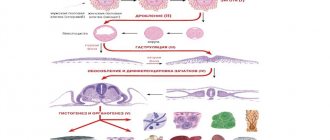When does a pregnant woman begin to feel the baby's movements?
The first pregnant woman feels the fetus moving already at 18–20 weeks.
This is an individual indicator, which depends on how pregnant the woman is (with each new pregnancy, movements are felt earlier and earlier), and on the sensitivity of the expectant mother. The number of movements of the baby by the 32nd week of intrauterine development is about 85–100 per day, over time their frequency decreases, and by the end of the third trimester there are “only” 50–60 movements per day. A sharp decrease or increase in a child’s physical activity or their cessation indicates a developmental pathology. 10–20 movements within 12 hours are considered a critical indicator. You should monitor changes in the abdomen and, if alarming symptoms are detected, immediately consult a doctor managing the pregnancy.
When should you consult a doctor?
Short-term pulsations in the abdomen during pregnancy are not an indicator of a threat to the health of the mother and the development of the baby. However, if a woman experiences pain, fever or spotting, she should immediately consult a doctor.
The reasons why a pregnant woman's stomach is shaking may be:
- ectopic pregnancy;
- flatulence;
- abdominal aortic aneurysm (pathology of the vessel wall, characterized by its expansion and stretching);
- hypertonicity of the uterus.
Self-medication while carrying a child is dangerous, since two lives are at risk: the expectant mother and the child. The appearance of signs of pathology should be discussed with your doctor, who will prescribe the necessary examinations and tests, and also prescribe treatment, if necessary.
What should be the normal movements of the fetus in the womb?
The movements of the unborn child cause different sensations in women. Some people feel vibration, others feel trembling or fluttering. Sometimes the baby's movements can be mistaken for bowel movements. Over time, the baby grows up, and his movements become more and more noticeable. Usually the movements do not cause concern to the mother, but when the baby is old enough, kicking or punching him in the stomach can become painful. This may indicate that he has adopted an awkward body position.
In the evening and at night, the active time of day begins for the baby in the womb. He begins to move vigorously. During the day, while the mother moves and sways, this calms and lulls him to sleep, but when the woman goes to bed, the swaying stops and the child begins to be active. In order to calm the baby, you can try drinking a glass of warm milk, singing him a song, listening to calm music, stroking his tummy, or changing his body position.
You should not go to bed on an empty stomach, as your child needs nutrition around the clock.
The baby is shaking in the stomach
The sensation of vibrations inside the uterus is not always felt so clearly. Sometimes a woman is so busy or anxious that she does not notice such changes. Only in a state of rest can one determine that the stomach seems to be vibrating, and the child is not awake, but is sleeping peacefully. Can such manifestations be considered pathologies, and how should we approach this?
You can determine that your stomach is vibrating by several signs:
- Pulsation is noted only in the lower abdomen.
- There is no sensation of pain or spasm.
- The child behaves as usual, there is no reason to worry.
- The vibration is similar to a vibration sound with frequent frequencies inside the liquid, that is, the signals are somewhat muffled.
A trembling child does not pose a danger either to the mother or to himself if such manifestations do not occur against the background of stress and anxiety of the mother.
Important.
When vibrating in the abdomen, there should be no painful sensations, and the woman herself does not feel an increase in the child’s activity, he behaves as before, he sleeps and is active at approximately the same time.
Why does the baby twitch rhythmically?
The origin of vibrations and cramps in the abdomen in pregnant women can be different. The doctor leading the pregnancy determines the cause of this phenomenon, based on a survey and examination. This condition is caused by hiccups, lack of oxygen or other reasons.
Baby hiccups
Indeed, babies often hiccup while in the womb. This phenomenon occurs due to the baby swallowing amniotic fluid. From the second trimester, he makes swallowing movements so that after birth he can breathe and eat. In the process of swallowing amniotic fluid, the muscles are strengthened and the child’s digestive system develops, the intestines train to digest food.
The baby's hiccups are accompanied by rhythmic vibrations of the abdomen, and the woman feels muscle contraction. A diaphragm spasm lasts from a few seconds to an hour and often causes discomfort in a pregnant woman, especially if it occurs frequently and lasts a long time. Some women with a low sensitivity threshold do not feel movements or vibrations.
The child does not have enough oxygen
Another reason why a pregnant woman feels like the baby is twitching in her stomach is the lack of oxygen received through the placenta and umbilical cord. This causes intrauterine fetal hypoxia, it is life-threatening for the child and occurs due to:
- bad habits of a pregnant woman;
- diseases of the expectant mother (anemia, heart disease, pyelonephritis, bronchitis);
- pathologies of pregnancy (hypertonicity of the uterus, placental abruption, Rh conflict, fetal malformations).
Other Possible Causes
There are other reasons for the sensation that the fetus seems to be trembling in the abdomen. The older baby begins to move more actively, reacting to noise. In the first trimester of pregnancy, cramps can be caused by increased intestinal motility, accumulation of gases, and colic. Increased uterine tone causes similar sensations. In the early stages, this can lead to spontaneous miscarriage.
Causes and mechanisms
Probably everyone understands that during pregnancy, almost every system of the body undergoes restructuring. The functioning of the heart and blood vessels, kidneys and gastrointestinal tract changes. Metabolic processes and immune reactions are more active. But the main role in ensuring a favorable pregnancy outcome lies with hormonal regulation.
The level of progesterone and estrogen during pregnancy increases significantly, and each trimester is marked by shifts in the level of biological substances. But the greatest leap is still observed in the early stages, when a woman’s body is just beginning to transform into a qualitatively different state. It is then that chills may occur, which are even considered a sign of pregnancy.
But this phenomenon also has a downside. Shivering may also occur for other reasons that cannot be classified as physiological. They cover obstetric pathology and a number of common diseases:
- Frozen pregnancy.
- Arterial hypotension.
- Hypothyroidism.
- Hypoglycemia.
- Infectious and inflammatory diseases.
In addition, chills can be provoked by a banal drop in room temperature or a flow of cold air. Trembling in the body, as a result of contraction of small muscle fibers, occurs against the background of emotional stress or physical fatigue. This symptom is nonspecific, and therefore characteristic of many conditions. And why it appeared in a particular woman remains to be found out by the doctor.
Chills often bother women during pregnancy. But what processes caused its development is a task for the diagnostician.
The cause of vibration is compression of the inferior vena cava
The expectant mother's blood volume increases by 30–40%, so her cardiovascular system is under greater strain. The rapidly growing uterus puts pressure on nearby blood vessels and can put pressure on the vena cava, the largest vessel that transports blood to the heart.
Symptoms of compression of the inferior vena cava:
- changes in blood pressure;
- cardiopalmus;
- dizziness;
- nausea, vomiting;
- tinnitus;
- hypoxia;
- weakness;
- dyspnea.
Symptoms appear when a pregnant woman lies on her back, so if discomfort occurs, you should change your body position without making sudden movements. If the condition improves after this, no additional measures need to be taken, but if the condition worsens, you should seek emergency help.
Why does the stomach pulsate in early and late pregnancy?
Pulsation in the abdomen in the early stages of pregnancy can directly signal the very beginning of fertilization and be one of the first harbingers of a “piquant” position. That is, having “received” a fertilized egg, the uterus begins to grow, change, initiating contraction-like rhythms - contracting. Often pregnant women mistake these signals for pulsating signs. Hormonal changes in the body due to pregnancy change the functioning of all organs, including the functional abilities of the gastrointestinal tract. Therefore, previously unknown bloating, indigestion, diarrhea and constipation occur already in the first couple of conception, accompanied by rumbling, sometimes pulsating movements in the belly.
Naturally, “experienced” mothers can easily distinguish the physiological characteristics of the body from the very nature of pregnancy, but first-time girls may be wary of these “urges.” The lion’s share of pregnant women will be assured that abdominal pulsation during late pregnancy is explained precisely by the baby’s intrauterine hiccups.
In fact, starting from the middle of pregnancy (from about 26-28 weeks), the baby trains the swallowing reflex so that upon birth it will be able to suck/swallow food (milk) and be able to breathe independently. Therefore, intrauterine hiccups are not a pathology, but are primarily due to the fact that the baby, being greedy, overate the amniotic fluid, or grabbed it very quickly.
Intrauterine hiccups are characterized by rhythmic twitching of the abdomen and last from several minutes to an hour and a half. If such pulsation creates discomfort, doctors recommend that mothers change their position: stand, lie down, or roll over to the other side. Breathing exercises and leisurely walks in the fresh air will help stop hiccups.
Many mothers perceive pulsating tremors during pregnancy as the baby’s first movements. It is a well-known thing that there is a percentage of girls who claim that these are not movements at all, but ordinary indigestion. But, if you like to think so, and such sensations began in the period of 18-20 weeks, they are permanent - then yes, this is exactly the first ardent greeting from your little one. Enjoy the conversation!
One of the likely causes of pulsation in the lower abdomen during pregnancy, according to experts, is the functioning of the vena cava, which runs along the spine on the right. This vein pumps blood from the lower part of the body. Therefore, due to the increase in the size of the uterus and the weight of the baby, it is compressed and the mother clearly feels pulsations in the abdominal area on the right.
Doctors strongly do not recommend that pregnant women sleep lying on their backs, but accustom and discipline themselves to rest on their left and right sides. Squeezing the vena cava is fraught with unstable blood circulation in the lower part of the body, which leads to “cutting off” oxygen to the baby. And this is a manifestation of hypoxia. The baby’s movements, his touching hiccups, even the movement of venous blood are considered the norm of pregnancy and should not lead expectant mothers into a stupor.
The expectant mother's blood volume increases by 30–40%, so her cardiovascular system is under greater strain. The rapidly growing uterus puts pressure on nearby blood vessels and can put pressure on the vena cava, the largest vessel that transports blood to the heart.
Symptoms of compression of the inferior vena cava:
- changes in blood pressure;
- cardiopalmus;
- dizziness;
- nausea, vomiting;
- tinnitus;
- hypoxia;
- weakness;
- dyspnea.
Symptoms appear when a pregnant woman lies on her back, so if discomfort occurs, you should change your body position without making sudden movements. If the condition improves after this, no additional measures need to be taken, but if the condition worsens, you should seek emergency help.
A feeling of pulsation in the tummy can be caused by various reasons.
One of the reasons for the pulsation may be the baby's hiccups in the stomach. This is felt closer to the 30th week of pregnancy and can last from several minutes to an hour. Why does a child hiccup? The digestive and respiratory organs develop. The child tries to control their work and may swallow amniotic fluid, resulting in hiccups.
When a child hiccups, the entire abdomen pulsates rhythmically, although the pregnant woman herself feels it only in its lower part. For some women, these sensations may be uncomfortable. If hiccups occur frequently and do not go away for a long time, you need to consult a doctor to rule out a lack of oxygen in the fetus.
If the pregnancy has exceeded 25 weeks, then the most likely cause of the pulsation is pinching of the vena cava. This happens due to the growth of the fetus and the enlargement of the uterus. The larger the uterus and baby become, the more pressure is placed on the organs, including the mother’s circulatory system. The vena cava is located to the right of the spine and can be compressed if a pregnant woman lies on her back.
Pinching of the vena cava occurs in 80% of women, and if it begins to cause discomfort, it is necessary to change the position of the body.
Fetal movement
From about 18-20 weeks during the first pregnancy and from 16 weeks during subsequent ones, the expectant mother begins to feel fetal movements. At first, these sensations resemble a weak pulsation, which intensifies with each subsequent week. By the 35th week, this is no longer a weak pulsation, but quite noticeable jolts, sometimes expectant mothers can even distinguish which part of the body the baby is pushing. Read more about when the baby begins to move in the tummy →
Why does my stomach vibrate?
A vein vibrating in the later stages or the lower part of the abdomen near the pubis arouses not fear, but interest of the expectant mother. Vibration in the abdomen during pregnancy is not a common complaint in gynecology, but many women also do not ask their gynecologist about its manifestation. This feature is partly due to the fact that the woman is embarrassed to ask or does not know how to correctly describe her feelings.
There may be several reasons for this manifestation:
- Pinching of the vena cava. If a woman feels or senses vibrations in the abdomen closer to the intestines, inside the abdomen, and not on its outer side, then this may indicate both the motility of the digestive system and the pinching of the vena cava. The latter option is considered conditionally pathological, and with mild manifestations does not pose a danger to the mother and baby. Light vibration with the baby’s unchanged behavior - this may be a manifestation of the fact that the child has settled on the lower fundus of the uterus and is pressing with its weight on the hollow artery; it begins to circulate blood more intensively, since such functions should not stop. The pressure inside the vena cava increases due to a decrease in the lumen, a slight numbness of the abdomen appears and at the same time pulsation or vibration can be observed. If such a manifestation occurs in a single case, then there is no need to worry. If symptoms increase, you should still consult a doctor. With frequent and regular long-term oxygen starvation, the baby risks not getting enough of the elements he needs, and the risk of developmental delay increases.
- Fermenting gases in the intestines or rectum of the mother. Since all the internal organs of a woman are severely infringed by the newly growing organism, there is a possibility of an increase in the fermentation process. This manifestation is accompanied by bloating, heaviness, and possibly upset stool for a short time or during a certain period of the day and night. As a rule, after physical activity this manifestation intensifies.
- A baby’s hiccups inside the tummy are a common manifestation that the mother is not aware of until a certain moment. This condition at 21-28 weeks is due to the active development of nerve endings and nerve fibers, their centralization, and after 2 weeks - due to the fact that mommy loves to indulge in sweet and starchy foods. In this case, the child swallows a lot of sweet amniotic water and begins to hiccup.
A slight vibration in the lower abdomen during pregnancy is not a pathology that you should worry about, but simply a need for additional monitoring of the mother’s condition and lifestyle. Often the signs and consequences of this feature are insufficient oxygen and vitamins. Changing your lifestyle will help improve the exchange process, the child will feel good and develop according to schedule.
Chills in early pregnancy
Every woman reacts differently to pregnancy. More precisely, the reaction of each organism is individual. Some women do not experience anything at all, and they do not experience it in the early stages. Others immediately fall into a state of anxiety, anticipating pregnancy symptoms. And sometimes the waiting period turns a woman simply into a neurasthenic.
Still other women, 6-7 days after conception, feel unwell and weak, have a fever or chills. This situation worries the woman a little, because while expecting pregnancy, she begins to assume that she has caught a cold. So what should she do next? Take antipyretic and anti-cold medications? It is too early to worry in such a situation, because the above symptoms may just mean pregnancy.
How are these symptoms related to successful conception? The optimal temperature for the existence of the fertilized egg is 37 degrees. For this reason, before ovulation, the basal temperature of a healthy woman always rises. The hormone progesterone is responsible for this increase. If conception has occurred and pregnancy has occurred, then the amount in the blood increases instead of its traditional decrease during menstruation. Accordingly, in some women the body responds to this phenomenon not only by increasing basal temperature, but also by increasing overall body temperature. This is where the symptoms of chills appear a week after conception.
For this reason, if you suspect pregnancy, you should not immediately worry and drink teas, do inhalations and eat lemons to relieve the symptoms of an imaginary cold. Do not rush to be treated even with folk remedies! If chills and weakness are indeed signals of pregnancy, then they will soon go away without any treatment, on their own. But walks in the fresh air during this period will be very useful.
What to do to reduce discomfort
If the state of vibration inside the uterus irritates or unnerves the mother, but no dangerous or pathological manifestations are noted either in the development of the baby or in its provision, some manipulations can be carried out. To prevent this condition, you should pay attention to your diet, walking and physical and breathing exercises.
Nutrition - recommendations
Since most problems in the development of pregnancy are caused by an incorrect, unbalanced diet, it is worth following the following recommendations at all stages of gestation:
- Eating in small portions.
- Do not drink water while eating food. That is, if you want to drink juice or water, then you should do it either before a meal or after, but not during, washing down the first or second courses.
- You can't combine proteins and carbohydrates. For example, it is better to eat meat with a side dish of vegetables or buckwheat, but not with potatoes or rice. Pasta should not be combined with meat or cheese, and during pregnancy grapes should generally be excluded or eaten in small quantities. In later stages, such a product contributes to the accumulation of gases in the intestines, as well as the gain of extra pounds for both mother and child.
- After eating, you don’t need to go to bed immediately, walk around the house, rest, watch TV, do breathing exercises, and only after 20-30 minutes you can rest. The digestive system also needs to prepare for sleep.
- You should not eat at night or after 8 pm. At such a time, the stomach is not able to digest food, and all reserves are put aside for later, which contributes to the incorrect functioning of the entire digestive system.
Recommendations for exercise and breathing
Proper breathing is the theorem of health and proper metabolism. In India, there is a whole hypothesis of a correct lifestyle, which includes the basics of correct breathing. Special exercises will help prepare for childbirth, supply the baby in the womb with the necessary amount of oxygen, and prepare the mother’s muscles for the passage of the baby’s head during childbirth.
Irregular, intermittent breathing or shortness of breath is also aggravated by the fact that the mother smoked before pregnancy. The lungs are contaminated with tar and nicotine, and therefore, with an even greater increased load, a feeling of weakness, clouding of reason, and nausea occurs. The basics of breathing are a task for specialists, but some exercises can be done at home by finding the necessary courses on the Internet.
Tremor in a child after vaccination
In some cases, after receiving one or another vaccination, the child may experience increased tremors or tremor in the chin, arms or legs. These symptoms indicate overexcitation of the baby’s nervous system and require consultation with a neurologist to carry out a number of diagnostic procedures and exclude serious neurological pathologies:
- Ultrasound of the brain;
- EEG and Echo-EG of the brain.
If a pathology is detected, the doctor may prescribe a course of medication or physiotherapeutic treatment. Subsequent vaccinations may be delayed until the baby’s nervous system functions are restored.
In a child under 3 months of age, tremors after vaccination may also be physiological, accompanied by crying from pain. In this case, when the child calms down, the manifestations of tremor disappear. No treatment is required.
Vibration in the abdomen during pregnancy is there a danger?
If vibration in the lower abdomen during pregnancy is noted in the later stages, this may be due to such a feature as stretching of the fundus of the uterus and an increase in its pressure on the walls of the peritoneum. Do not also forget that the vena cava is located below. Supplying the placenta with all necessary elements and oxygen. When it is pinched, mommy may also feel discomfort.
In the early stages, vibration in the lower abdomen during pregnancy is observed less frequently than in the later stages. This is explained by the same growing belly, which puts pressure on all internal organs in the later weeks of pregnancy. Since such a factor is excluded in the early stages, there are few reasons why changes would be noted.
If during pregnancy a woman notices that vibration in the lower abdomen occurs after stress or a nervous breakdown, then most likely such negative consequences are the result of a nervous breakdown of the expectant mother. During the gestation period, the nervous system, like the supporting organs of women, works hard. Sometimes even the most harmless meaning or word means an unstable emotional state. After the experience, you can hear a pulsation in the lower abdomen.
Chills as a sign of fading pregnancy
Chills during pregnancy can also be the result of a missed miscarriage. This phenomenon can occur towards the end of the first trimester, around the eight-week mark. Then chills occur due to intoxication of the body and are the latest sign. Its manifestation occurs at the end of the second week, after the appearance of the first symptoms, which may be: End of early toxicosis Drop in body temperature Return of the mammary glands to their normal state Vaginal discharge containing blood
Therefore, if any of these symptoms appear, you should immediately consult a doctor. He will do an ultrasound examination of the uterus and fetus to diagnose the problem and make a diagnosis. In general, chills can indicate a number of problems and under no circumstances should you ignore them. You should also not try to diagnose or treat the disease yourself. It is better to contact qualified specialists. They will be able to provide you with the help you need.
Chills during pregnancy can be called a fairly common occurrence. The unpleasant sensations experienced by pregnant women appear due to hormonal changes in the body. In this case, there is no reason to worry. But if chills are accompanied by other alarming symptoms, then you should immediately see a doctor to determine the exact cause of the phenomenon and begin adequate treatment.
If chills appear in a completely healthy woman, then it indicates hormonal changes that accompany any pregnancy and should not be a reason for panic. But you shouldn’t hide this unpleasant feeling from the gynecologist, since the doctor must be aware of all the processes occurring in his patient’s body.
Most often, chills make themselves felt
a few weeks after conception and are observed throughout the first trimester.
We can talk about the normal course of pregnancy when the discomfort disappears after two months and is not accompanied by an increase in body temperature.
A woman carrying a baby should closely monitor her health. It is recommended to visit a doctor if the following symptoms occur along with chills:
- Jumps in blood pressure, which may indicate fetal pathologies.
- Excessive urge to urinate and painful sensations in the abdomen. This is a sign that an inflammatory process is occurring in the patient’s bladder.
- An increase in temperature, indicating the penetration of an infection or virus into the body.
Trembling in the body, which is not associated with temperature or any disease, can be explained simply: during pregnancy, the body intensively produces progesterone, which irritates the hypothalamus. This phenomenon leads to chills, since in the absence of a fetus this hormone is produced in smaller quantities.
Appearance in early pregnancy
Women react to pregnancy differently. Exacerbations of chronic diseases, nausea and severe toxicosis or psychosis are often observed against the background of excitement in anticipation of the first child. It may also be that a few days after conception, a woman feels weakness, increased basal temperature and severe chills. This condition always worries a girl who expects signs of pregnancy, not a cold. But you should not worry, because it is precisely this reaction of the body that often indicates the presence of a fetus.
A woman’s body is designed in such a way that an embryonated egg can only develop at a temperature of at least 37 degrees Celsius, regardless of whether it is a boy or a girl. This explains the fact that at the beginning of ovulation, the temperature becomes higher and the production of progesterone increases. If conception occurs, the hormone level does not decrease, but only increases. Therefore, in the early stages, goosebumps are observed.
At 6 weeks of pregnancy
The first trimester of bearing a baby is considered the most dangerous and difficult period. At this time, the formation of the fetus begins (the gender of the child does not play a role in this), and its rapid growth occurs in the sixth week. During this period, there is a high risk of unauthorized termination of pregnancy, so the chills that appear should alert the expectant mother.
A woman should immediately see a gynecologist if the following unpleasant sensations occur: a feeling of rectal constriction, pain in the lower abdomen, vaginal discharge. If you consult a doctor in a timely manner and the sixth week goes well, the chances of saving and giving birth to a healthy child increase significantly.
Appearing at a later date
Goose bumps and a feeling of cold, which are observed in the later stages of pregnancy, cause the greatest concern. In this case, we are talking about frozen pregnancy - one of the most terrible pathologies.
A number of symptoms indicate this phenomenon:
- Disappearance of chest pain and toxicosis.
- Stop dizziness in the morning.
- Unreasonable rise in temperature.
A frozen pregnancy is manifested by the death of the fetus, which is not rejected by the body, but continues to be in the girl’s body. If such a situation arises, then the woman experiences intoxication from a decomposing corpse. When diagnosing a frozen fetus, the patient is given drugs that provoke uterine contractions and miscarriage.
Abdominal throbbing during pregnancy
From the moment a pregnant woman registers, at each examination the doctor carefully examines and listens to the tummy. The expectant mother also constantly monitors the feelings and sensations in her stomach, monitors its growth and acquired forms.
Most women are faced with such an innovation as pulsation in the abdomen. This question certainly begins to worry them. But there is no clear answer to this question, since there may be several reasons.
We must also take into account the fact that each woman can describe certain sensations in her own way.
Therefore, for a “decoding” you need to contact your doctor.
We, in turn, will tell you about the most common options, why this happens and how you can help yourself.
Pulsation in the lower abdomen during early pregnancy
As a rule, such pulsation does not cause any noticeable pain or discomfort. If this happens with enviable regularity, you should pay due attention to it. But in most cases, if the pulsation in the early stages is painless, it can be caused by a number of reasons: • Intestinal spasms. • Uterine tone.
• The child begins to move actively. If these are spasms, then the pain may throb around the navel, and if it is the tone of the uterus, then it is felt in the lower abdomen. If the pulsation is pronounced, causes pain and spotting appears, a consultation with a gynecologist is urgently needed.
This is extremely dangerous, as it can mean an ectopic pregnancy and contribute to the rupture of the tube.
It happens when pulsation occurs in the area of the womb - in this case, the doctor also needs to be notified, as this may indicate high tone of the uterus, which in turn subsequently leads to premature birth.
If, according to the doctor, the pulsation in the abdomen is caused by gastrointestinal colic, then it is necessary to adhere to a special diet (eliminate harmful foods and add more vegetables and fruits to the diet, as well as fermented milk products and various cereals).
Constipation and irregular bowel movements also harm pregnancy. So, during constipation, harmful substances are absorbed into the body through the intestines, and if stool is too frequent, the child does not have time to receive all the substances he needs.
Cereals contain fiber, which helps cleanse the intestines. It is worth excluding foods that cause gas formation in the intestines, as this will cause the stomach to pulsate regardless of the period.
Pulsation rhythm variable
In most cases, pulsation in the abdomen is associated with fetal mobility. This mobility causes increased blood flow to the abdominal organs, promoting intestinal metabolism.
In this case, pain occurs with varying degrees of intensity, and after about twenty minutes, pulsation begins to be felt.
There are also babies who actively want to move while still in the womb - they show their activity for a long time and perform various movements.
Dangerous pulsation
• If the pain throbs and radiates to the lower back, contractions are most likely starting. If the due date is not soon, then this is very, very dangerous. In this case, most of the muscles of the abdomen and back become tense, and an irresistible desire arises to go to the toilet in a big way. As soon as the muscles relax, the throbbing pain subsides, but as soon as they tense up, it arises again.
If your pregnancy is less than thirty-six weeks, call your doctor immediately. If the outcome is successful, these will turn out to be false contractions. • If the pain pulsates in the lower abdomen on the right, this is pinching of the abdominal aorta (it delivers blood to the uterus, and if it does not function properly, it causes oxygen deficiency in the fetus).
Blood pressure may also rise or fall sharply, nausea and even vomiting may begin, dizziness may occur, and your vision will become dark. In this case, you need to rest, change your body position while sleeping, and everything will go away by itself. To avoid pinching of the abdominal aorta, it is forbidden to sleep on your back or make sudden oblique movements.
It is necessary to urgently consult a doctor if, with the above recommendations, the throbbing pain does not go away, and in some cases even intensifies.
• Also, pulsation can be caused by hypoxia - when oxygen reaches the child in limited quantities.
Pregnancy is a very important, difficult and responsible moment, therefore, as soon as any unpleasant, painful, pulsating sensations arise, a consultation with your gynecologist is urgently needed.
The health of the unborn child should come first, so it is better to play it safe in order to avoid unwanted consequences. Using a conventional ultrasonic examination, you can easily check the condition of the fetus.
Baby's hiccups cause abdominal throbbing
If the period is more than twenty-seven weeks, there is pulsation, but no pain. What could this mean? It is at this time that the child begins to make attempts to learn to swallow, for the further development of the digestive system.
And since the baby is in the water, he involuntarily swallows amniotic fluid, which causes hiccups to begin. On average, this process lasts no more than an hour.
When the fetus hiccups, the stomach begins to twitch, which causes a sensation of pulsation.
Infringement of the vena cava as a cause of pulsation
Most often, the cause of pulsation in the abdomen is not as safe as a child’s hiccups. The gynecologist can also determine whether the vena cava is pulsating, which runs along the spine on the right. This vein can be pinched due to the incorrect position of the mother or the unborn fetus.
This symptom may appear at the twenty-fifth week or a little earlier, all this is associated with the weight gain of the unborn child and the growth of the uterus.
When this vein is compressed, the blood flow in the uterus is disrupted, which causes pulsation, and if the vein is critically compressed, the woman can feel very sick and dizzy, even to the point of losing consciousness.
Let us repeat once again that it is strictly not recommended to sleep on your back!
What to do if there is pulsation
Without consulting a specialist, it is difficult to determine what is causing the pulsation. • If the sensation of pulsation causes discomfort, there are several options on how you can help yourself. The first option is to change your position if you are lying down. The second option is to sit down to rest, then walk, and the pulsation should go away. This will help if you have a pinched vena cava.
• If a baby is hiccupping inside you, then you just need to endure it, there is nothing you can do to help yourself in this case. If this condition appears quite often and lasts quite a long time, it is necessary to consult a specialist for advice and recommendations in order to determine oxygen starvation in the child and avoid undesirable consequences.
• It also happens that a woman begins to feel pulsation in the lower abdomen already in the first days of pregnancy, as the embryo begins to intensively feed from the woman’s uterus.
The most important thing is to register during pregnancy and be closely supervised by a doctor, in order to avoid unwanted consequences.
Often searched for:
- where it should pulsate in the early stages
- twitching in the lower abdomen during early pregnancy
- throbbing pain 1st trimester
- throbbing pain in the lower abdomen during pregnancy
- throbbing pain in early pregnancy
Source: https://proberemennost.com/pulsaciya-zhivota-vo-vremya-beremennosti.html











